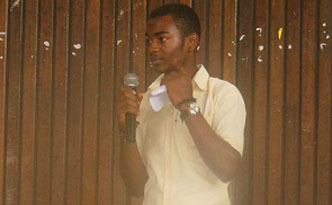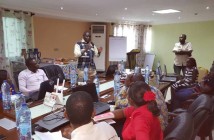On 11 May 2013, four schools (Government Technical High School ,Bilingual Grammar School, St Therese Bilingual College and Government High School Buea Town) took part in the inaugural Eco-challenge. This year’s theme was ‘sustainability in our community.’
Each school had one month to identify and develop their idea, which they presented at the event. GHS Buea town identified insufficient water supply in Buea town. They proposed the building of a water catchment so as to have regular and available supply of water.
St Therese Bilingual College felt that their priority intervention should reduce emission of carbon monoxide, carbon dioxide and other dangerous gases in to the atmosphere to prevent green house effect and air pollution which is very dangerous to human health. To achieve this, they proposed a prototype fuel efficient stove using locally available natural resources.
G.T.H.S Molyko students were most concerned about waste management in their communities. Therefore, they proposed creation of a project that would promote recycling of waste among community members. With regard to green waste, they thought that peelings of banana and other food stuffs, leaves, stems of some trees could serve as food to other animals and excreta from some animals could be used as manure. They also talked about taking waste like iron to recycling companies and things made of rubber for recycling in companies that produces rubber materials.
Whereas B.G.S Molyko were also concerned about waste management, their focus was mostly on plastic bottles. They were concerned about the rate of littering of bottles that did not compose, and which when collected and burnt, led to air pollution. Their suggested project would therefore seek to set up a plastic waste collection center and build partnerships with companies that would receive bottles for recycling.
The presentations from the four schools were judged based on predetermined criteria. The event also included talks from various guests and EGI staff. Students were awarded certificates of participation, and the top three schools received certificates of good performance. In the months preceding the next annual Eco-challenge to take place in 2014, EGI will work with the individual schools to develop detailed plans from their ideas and start implementing them.



